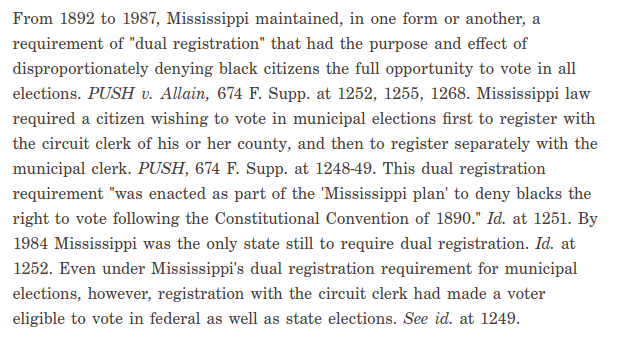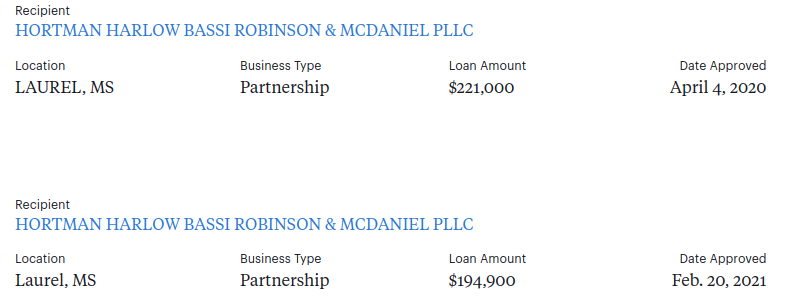
THREAD: Mississippi has had dual systems of voter registration for nearly all our state's history, and this New Hampshire proposal brings to mind Mississippi's sordid history in this area. 1/
https://twitter.com/PoliticsWolf/status/1394337003492102147
MS first instituted a dual voter registration following MS's 1890 constitutional convention, requiring voters to register with their city clerk for municipal elections separate from registering with the county for state and federal elections. aclu.org/legal-document… 2/ 

Pam Karlan—who is now principal deputy AAG of DOJ's @CivilRights Division—represented plaintiffs who challenged Mississippi's separate-municipal dual voter registration system in the 1980s federal case, Martin v. Allain. casetext.com/case/martin-v-… 3/ 

The court agreed with Karlan that Mississippi's separate-municipal dual registration system discriminated against minorities. casetext.com/case/martin-v-… 4/ 

Accordingly, the court found that Karlan had proven Mississippi's separate-municipal dual registration system violated Section 2 of the VRA. casetext.com/case/martin-v-… 5/ 

As a result, MS abandoned our separate-municipal dual registration system and had a unitary system of voter registration—where all voters could register to vote in elections for which they were eligible with just one registration—until the governorship of Kirk Fordice. 6/
As Fordice said explicitly a few weeks after he took office in 1992, Fordice viewed himself as succeeding with black voters because black voter turnout in MS remained low. 7/
Like-minded members of the #MSleg—including then-chair of the MS Senate Elections Committee @SenatorWicker—celebrted Fordice's victory by enacting various new elections procedures to "combat fraud." dolearchivecollections.ku.edu/collections/sp… 8/ 

But MS did not institute its second system of dual voter registration until the National Voter Registration Act (a/k/a "Motor Voter") took effect in 1995, enabling voters to easily register to vote in federal elections at driver license and public assistance offices. 9/
Numerous MS officials opposed Motor Voter in its entirety.
For example, several of the first bills then-Rep. @RogerWicker first cosponsored in Congress after taking office in January 2015 were bills to repeal, delay, or impede Motor Voter: 10/
For example, several of the first bills then-Rep. @RogerWicker first cosponsored in Congress after taking office in January 2015 were bills to repeal, delay, or impede Motor Voter: 10/
See:
congress.gov/bill/104th-con…
congress.gov/bill/104th-con…
congress.gov/bill/104th-con…
congress.gov/bill/104th-con… 11/
congress.gov/bill/104th-con…
congress.gov/bill/104th-con…
congress.gov/bill/104th-con…
congress.gov/bill/104th-con… 11/
Meanwhile, Wicker's counterparts in the statehouse refused to pass law allowing voter registrations submitted pursuant to Motor Voter to register the voter for state and local elections in addition to federal elections. 12/
MS state officials at the time used dog whistles about welfare recipients in order to try and make their opposition to Motor Voter seem appealing to white-resentment voters. play.google.com/books/reader?i… 13/ 

But MS didn't merely deprive voters who registered via NVRA of the right to vote in state/local elections.
MS also didn't TELL voters the NVRA form provided to them at gov't offices would register them to vote in federal elections only and not in state/local elections. 14/
MS also didn't TELL voters the NVRA form provided to them at gov't offices would register them to vote in federal elections only and not in state/local elections. 14/
MS voters challenged MS's separate-federal dual registration system all the way to SCOTUS in the case known as Young v. Fordice. 15/
The @AP reported at the time:
"Mississippi is seeking to remain the only state in the nation with separate registration procedures for federal and state elections." 16/
apnews.com/article/ff5110…
"Mississippi is seeking to remain the only state in the nation with separate registration procedures for federal and state elections." 16/
apnews.com/article/ff5110…
Justices across the bench balked at MS's argument that it could operate a confusing, counterintuitive dual registration system without even submitting its plan for NVRA compliance for VRA preclearance. 17/
Justice Ginsburg expressed particular concern about MS's willingness to deceive voters, allowing voters to incorrectly believe an NVRA registration form would register them to vote in all MS elections for which they were eligible. 18/
Justice O'Connor also balked at the notion that MS could implement the NVRA via such a confusing dual voter registration system without even needing preclearance from DOJ. 19/
Even Justice Scalia was "concerned that DOJ ought to be able to protect MS voters from being misled. ... Then, they appear at the state voting place, and they find that they can't vote. ...
"How can the AG prevent the State of Mississippi from misleading citizens that way?" 20/
"How can the AG prevent the State of Mississippi from misleading citizens that way?" 20/
SCOTUS ruled against MS in a unanimous opinion by Justice Breyer, holding that the VRA required MS to submit its full plan for NVRA compliance to DOJ for preclearance. casetext.com/case/young-v-f… 21/
MS submitted plans to DOJ to implement a separate-federal dual registration system, and DOJ objected, denying preclearance. play.google.com/books/reader?i… 22/
DOJ told MS it would not preclear the dual registration system because the MS ha's implementation of the dual registration system was discriminatory. play.google.com/books/reader?i…
(That was, after all, the dual registration system's purpose. 🤫) 23/
(That was, after all, the dual registration system's purpose. 🤫) 23/

Undeterred, Fordice persisted in his campaign against Motor Voter and vetoed legislation to end MS's dual registration system, arguing in his 1998 State of the State address (below) that the NVRA had opened floodgates of voter fraud. 24/
Bill Minor, known as "the Conscience of MS," wrote in @DJournalnow at the time of Fordice's veto:
"There were untold numbers of cases of deprivation and frustration for citizens trying to exercise the right to vote and finding they could not." 25/
djournal.com/news/bill-mino…
"There were untold numbers of cases of deprivation and frustration for citizens trying to exercise the right to vote and finding they could not." 25/
djournal.com/news/bill-mino…
MS did not enact state law restoring a unitary election system until Fordice's second term ended and Gov. @ronniemusgrove took office in 2000 and signed HB 763, which authorized all NVRA-registered voters in MS to vote in state and local elections. billstatus.ls.state.ms.us/2000/pdf/histo… 26/
Attorney @brendawright06, who represented the plaintiffs in Young v. Fordice, later reflected that the entire episode underscored the importance and power for VRA preclearance to protect voters. dc.law.mc.edu/cgi/viewconten… 27/ 

And indeed, Young v. Fordice not only led to the termination of Mississippi's second system of dual voter registration—it also ended MS's aspiration to HAVE a dual system of elections for 20+ years, until that idea resurfaced in MS after the 2020 election. 28/
To that end, following passage of the For the People Act by the US House, MS's current secretary of state @MichaelWatsonMS promoted the idea of returning to a separate-federal dual election system as the "best-case scenario" for MS should HR1/S1 pass. wlox.com/video/2021/04/… 29/
If the For the People Act does pass, and if MS follows through with @MississippiSOS's recommendation to pursue a dual election system to prevent that law's application to state and local elections, it will be MS's third system of dual voter registration. 30/
MS adopted its first system of dual voter registration expressly to prevent black MSians from voting, and Fordice sold MS's second system of dual voter registration as necessary to prevent a "welfare voter" from voting. 31/
Some people might argue that selling MS's potential third system of dual voter registration as a means to prevent "woke college students" from voting is a distinction that makes a difference. 32/
But what MS's 1st, 2nd, and potential 3rd systems of dual voter registration have in common is that they all relied on the pitch that certain classes of eligible voters were too uninformed or unfit to be allowed to vote, and so they should be stopped. 33/
https://twitter.com/ashtonpittman/status/1379895072825741317
VRA preclearance—which brought about the end of MS's 2nd system of dual voter registration—no longer covers MS following SCOTUS' 2013 decision in Shelby County v. Holder and in light of the Senate's refusal (inc. that of @SenatorWicker) to restore the VRA. 34/
But if MS follows through to create a 3rd dual system of elections as @MississippiSOS suggests, all three systems will whare one thing in common—the civil rights lawyers who fight to end the 3rd such system will include many of the people who ended the prior systems. 35/
That is because MS's 1st and 2nd system of dual voter registration did not end back in the days of Brown v. Board of Education or in the time of JFK and LBJ.
Rather, they ended in my own lifetime, as a millennial. 36/
Rather, they ended in my own lifetime, as a millennial. 36/
The lawyers who fought those fights, representing MS voters or representing DOJ when it supported them—like Pam Karlan, Brenda Wright, Walter Dellinger, Deval Patrick, Rob McDuff, and Seth Waxman—are going strong, fighting the good fight. 37/
And while some of these lawyers may be surprised by the potential Mississippification of New Hampshire, they will fight there too. 38/
https://twitter.com/PoliticsWolf/status/1394337003492102147
• • •
Missing some Tweet in this thread? You can try to
force a refresh






